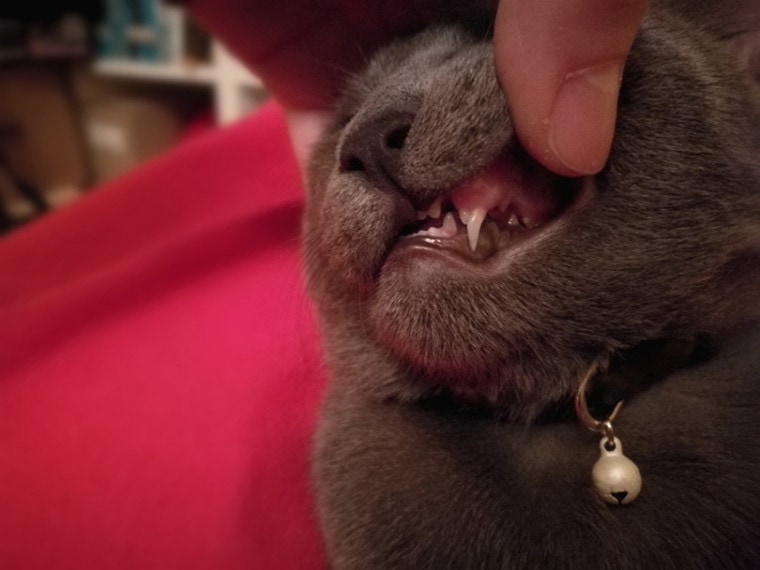
Cats have their full set of permanent teeth at around 6 months of age, but many cats start to show signs of dental disease as early as age 3 if their teeth aren’t properly cared for during their early life. It is not normal for adult cats to lose teeth. Tooth loss is often a sign of advanced dental disease, and the cat needs to be seen by a vet as soon as possible to prevent further tooth loss. Dental care is just as important for cats as it is for humans, with many veterinarians encouraging proper teeth brushing to prevent dental diseases in our furry feline friends.
What Is Dental Disease?
Dental disease is a common issue in felines over the age of 3, but it can occur in cats of any age. Similarly to what happens in humans, plaque builds on the surfaces of your cat’s teeth, leading to tartar buildup over time. This buildup contributes to gingivitis (inflammation of the gums), periodontitis (inflammation of the tissues around the teeth), and tooth resorption (a process in which the tooth structure breaks down). When periodontitis develops, it is considered an irreversible disease, and in severe cases, it can cause your cat to lose one or more teeth. Tooth resorption is the most common cause of tooth loss in cats.

Prevention Of Dental Disease
Veterinarians encourage brushing your cats’ teeth daily with pet toothpaste to prevent gingivitis and tooth loss. Training your cat to accept daily tooth brushing may take some time, but many cats learn to accept it when they are rewarded for cooperating with the brushing. If your cat won’t accept having their teeth brushed, speak to your vet for tailored advice. Greenies and Purina DentaLife are just two of the dental treats you can give your cat to help keep their teeth healthy, along with toothbrushing.
Treatment Of Dental Disease
If your adult cat has lost a tooth, make an appointment with your vet immediately. They will perform an exam to check your cat’s mouth and body thoroughly. If your cat shows signs of gingivitis, the vet will likely recommend a professional deep cleaning and polishing done under anesthesia at their office. They will likely also take X-rays to determine any signs of tooth resorption, also called feline odontoclastic resorptive lesions (FORLs). They may recommend removing teeth that appear healthy on the outside but internal damage is visible on the X-rays. After treatment, your cat’s teeth will need daily brushing to prevent further plaque buildup and tartar formation. Your vet may also recommend additional steps, such as a prescription diet.

A Note About Kitten Tooth Loss
Starting around 3 months of age, kittens start losing their baby teeth. They typically lose these teeth while playing or during mealtime, and their human owners never even notice the lost teeth around the house. Your kitten will replace them with adult teeth quickly, and they will have 30 teeth before their first birthday. If you do see your kitten’s teeth around the house, don’t be concerned, as this is a normal stage of development. If their adult teeth don’t start coming in shortly after tooth loss, make an appointment with your vet to get your kitten checked out.
Conclusion
Tooth loss is abnormal in adult cats and must be addressed immediately. It’s usually an indicator of advanced dental disease, and the cat is likely experiencing extreme pain in their mouth from their dental issues. Tooth loss can be prevented by keeping an excellent daily oral homecare routine of brushing your cat’s teeth every day. Dental treats can also be beneficial to help fight plaque buildup. If your cat does have dental disease, the vet can perform a deep cleaning while your pet is under anesthesia, and they will assess your cat to determine the full extent of the damage. Prevention is the best step to help prevent tooth loss in cats, but that is not always possible, depending on a cat’s origins. If your cat is experiencing dental disease, a qualified veterinarian can help address the issue, so it’s best to make an appointment immediately.
Featured Image Credit: jasna.B, Shutterstock







